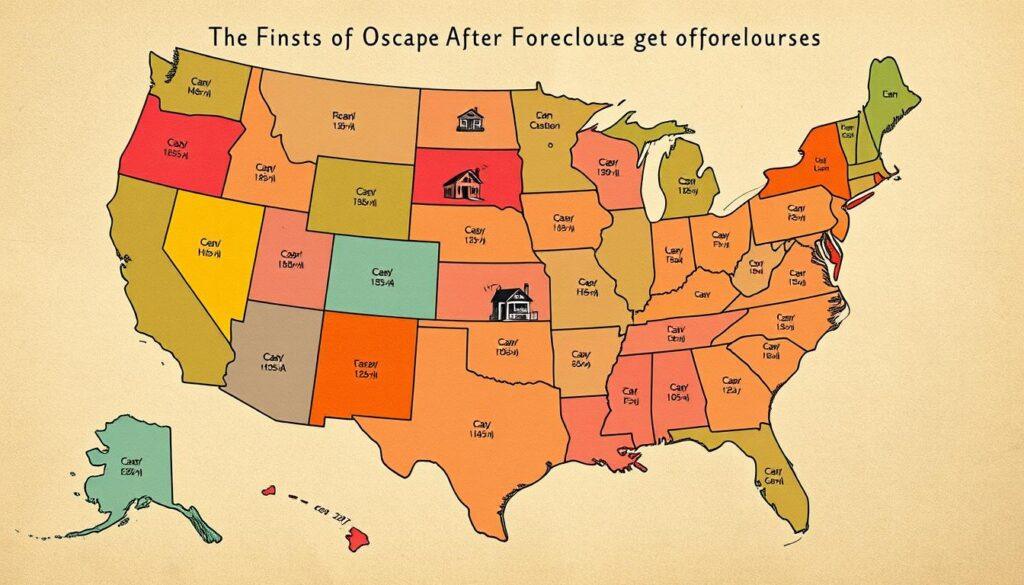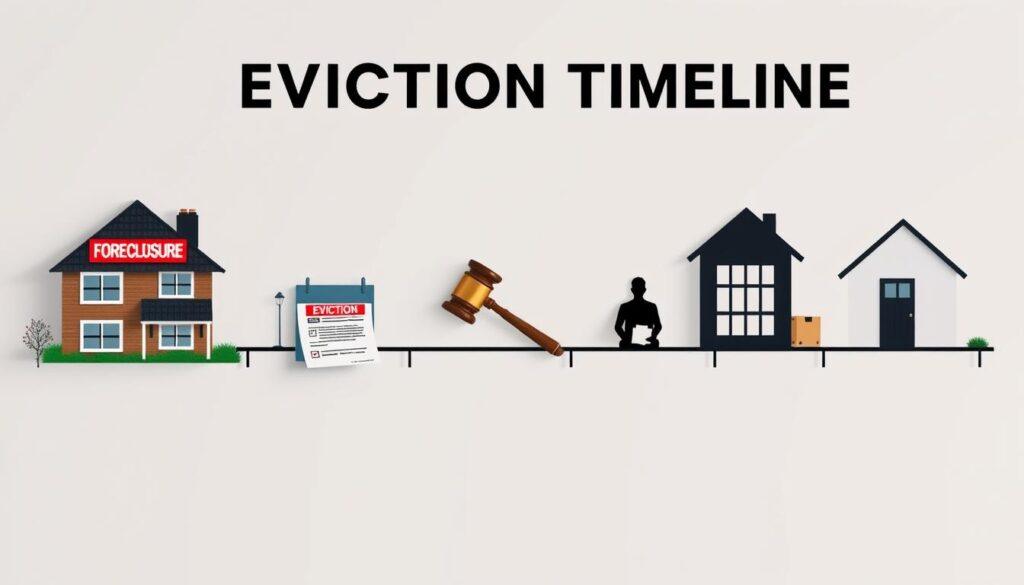Ever thought about staying in your home longer after foreclosure starts? Knowing how long you can stay is key. The time allowed varies by state and your situation.
At least 15 states let homeowners buy back their homes during a “redemption period.” This article explains how long you can stay in your home after foreclosure. It’s important to know this when facing such challenges.
If you’re in this situation, you might need help fast. Companies like Pierre Home Buyers offer quick cash for your home.
Key Takeaways
- 1 in every 200 people faces foreclosure, highlighting its prevalence.
- Many states offer a redemption period post-foreclosure, extending the time homeowners can stay in their homes.
- Federal protections have temporarily halted evictions for homeowners with Fannie Mae and Freddie Mac loans.
- Understanding state-specific laws is crucial for maximizing your staying in home after foreclosure.
- Filing bankruptcy can add valuable time during the foreclosure process.
Understanding Foreclosure
Foreclosure is a legal way for lenders to take back a property when a borrower can’t pay their mortgage. It affects homeowners and follows different legal steps in each state. Knowing the foreclosure process is key to understanding how long you might stay in your home.
Definition and Process of Foreclosure
Foreclosure starts when a borrower misses mortgage payments. Lenders give homeowners about 30 days to catch up before starting legal action. After 90 days without payment, lenders send a notice of default (NOD).
It’s important to know that federal rules say lenders can’t start foreclosure until a borrower is 120 days late.
Different Types of Foreclosure: Judicial and Nonjudicial
Foreclosure comes in two main types: judicial and nonjudicial. Judicial foreclosure needs a court lawsuit to take the property. Nonjudicial foreclosure doesn’t need court approval and is faster.
Each type follows state laws. States set different times from the notice of demand to the auction date, from two to three months.
Federal and State Guidelines on Foreclosure
Federal and state rules on foreclosure help protect homeowners. Federal laws say foreclosure can’t start until a borrower is 120 days late. State laws can change the foreclosure process, including how long it takes.
All foreclosure types require public notices. This ensures the process is open and fair. The rules can affect how quickly lenders can take back a property.
| Type of Foreclosure | Process Involvement | Typical Duration | Public Notice Requirement |
|---|---|---|---|
| Judicial Foreclosure | Requires court intervention | 3-6 months | Yes |
| Nonjudicial Foreclosure | No court involvement | 2-3 months | Yes |
How Long Can You Stay In Your House After Foreclosure
The time you can stay in your home after foreclosure varies by state. Each state has its own rules about how long you can stay. In some places, you might only have a few weeks, while in others, you could have months.
State-Specific Time Frames for Occupancy
In Georgia, you might have a few weeks to a few months to stay after foreclosure. If you don’t leave, you could be seen as a “tenant at sufferance.” The local Magistrate court can then ask you to leave if you don’t comply within the given time.
Once the deadline passes, the new owner can start eviction. This usually happens a few days later. You’ll get seven days to respond to eviction papers. If the case goes to court, a judge will decide. If you lose, the Sheriff can remove you and your belongings.
Factors Affecting Post-Foreclosure Stay Duration
Many things can change how long you can stay in your home after foreclosure. Important factors include:
- The type of foreclosure process used (judicial or nonjudicial).
- Your relationship with the new owner, which can affect negotiations.
- Filing for bankruptcy, which can slow down eviction.
It’s important to start planning your move early. You should pack, find a new place to live, and deal with your finances. Talking to your lender about mortgage modifications or selling the property quickly can also help.

Foreclosure Eviction Timeline
It’s important to know the foreclosure eviction timeline for homeowners and tenants. The process starts with eviction notices that affect how long you can stay. Each state has its own rules, so it’s key to understand these to deal with eviction uncertainty.
Eviction Notices and the Importance of State Laws
The foreclosure eviction process starts with a Notice of Default. This gives the homeowner 90 days to catch up on payments. If they don’t, a Notice of Trustee’s Sale is issued, leading to a property auction. After the sale, the new owner can send eviction notices, including a 3-day notice for homeowners and a 90-day notice for tenants.
Knowing state laws about these notices is crucial. They set the rules for when and how evictions can happen.
Steps in the Foreclosure Eviction Process
The foreclosure eviction process differs in judicial and nonjudicial states. Judicial states require a court hearing before eviction. Nonjudicial states have a simpler process, leading to quicker evictions.
After the property is sold, the buyer can send eviction notices. This could lead to quick removal of occupants unless they take action. Options include filing a lawsuit or using the “Protecting Tenants at Foreclosure Act of 2009” to protect rights. It’s vital to stay informed about these steps and the timeline to avoid displacement.

Post-Foreclosure Occupancy Rights
Knowing your rights during foreclosure is key for homeowners in tough times. Many don’t know they can stay in their home even after a foreclosure auction. Homeowners have legal rights, like contesting the foreclosure and getting legal help, to help them through this.
Understanding Your Rights During Foreclosure
Homeowners often have rights to stay in their home after foreclosure. They can challenge errors in the foreclosure process and demand clear communication from lenders. Getting legal advice is crucial for making informed decisions and possibly staying longer in their homes.
Potential Options for Staying in Your Home Longer
Homeowners can try different ways to stay in their home longer. One option is negotiating a lease-back with the new owner. Sometimes, landlords offer money to leave quickly, helping with financial stress. Looking into federal and state programs, especially those from HUD, can also offer important help.
| Post-Foreclosure Options | Description |
|---|---|
| Lease-Back Agreement | A rental arrangement with the new owner, allowing you to stay in your home temporarily. |
| Financial Incentives | Offers from the new owner to vacate the property quickly, easing financial struggles. |
| Government Programs | Resources from organizations like HUD that assist homeowners facing foreclosure. |
| Legal Contestation | Disputing the legality of the foreclosure process can buy time and options during legal proceedings. |
Foreclosure Redemption Period
The foreclosure redemption period is a key time for homeowners to try and get their property back after foreclosure. This period varies by state and gives homeowners a chance to recover their lost property. It’s important to know about this period and the laws in your state.
Definition and Importance of Redemption Period
This period lets homeowners pay off the mortgage balance, interest, and fees to get their property back. It can last from a few days to a year, depending on the state. Knowing this time frame is crucial for homeowners to fix their finances and plan their next steps.
State Laws Regarding Redemption Periods
States have different rules for the foreclosure redemption period. For example, California usually allows a redemption period before a foreclosure sale. But, some areas give homeowners a chance to redeem after the sale. Here’s a look at redemption periods in some states:
| State | Redemption Period Duration | Type of Foreclosure |
|---|---|---|
| California | Up to 1 year (judicial foreclosures) | Primarily non-judicial; no post-sale redemption |
| Texas | 0 days (no statutory redemption) | Non-judicial |
| New York | Up to 1 year (after sale) | Judicial |
| Florida | 0 days (no statutory redemption) | Non-judicial |
| Illinois | Up to 7 months (after sale) | Judicial |
It’s wise to talk to a foreclosure attorney to understand these laws. They can offer valuable advice and help homeowners make the right choices during this important time.
Can Bankruptcy Extend Your Stay?
Filing for bankruptcy can change how foreclosure and eviction work. It gives homeowners important protections. The automatic stay provision kicks in right when you file. It stops creditors from trying to kick you out.
The Automatic Stay Provision
The automatic stay pauses foreclosure, giving you time to think. It lets you stay in your home while you figure out bankruptcy. This stay can last months, depending on your bankruptcy type.
Impact of Bankruptcy on Foreclosure and Eviction Timelines
Bankruptcy can slow down foreclosure, giving you a break. For example, Chapter 7 can delay foreclosure for up to four months. Chapter 13 lets you make a plan to pay off debts over five years, keeping you in your home.
If you’ve gotten an eviction notice, bankruptcy might help. It can give you at least 30 more days to stay. Getting legal advice is key to using bankruptcy wisely. It can really help in foreclosure situations.
Conclusion
How long homeowners can stay in their home after foreclosure changes a lot. It depends on state laws, the foreclosure process, and personal situations. Knowing your rights and options during foreclosure is very important.
Getting legal advice can really help. A lawyer can explain your choices and find ways to keep you in your home longer. Companies like Pierre Home Buyers can also help quickly and protect your interests.
Being informed is the first step. Knowing about foreclosure rules and options helps you make smart choices. This knowledge is key during tough times.






